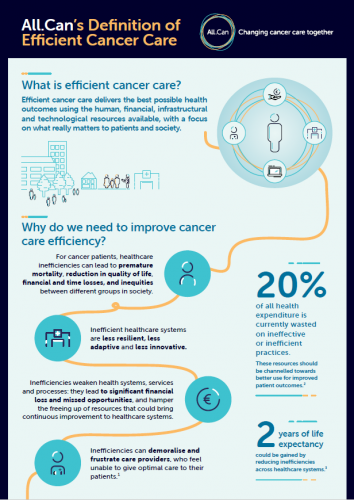
Author: Borna Ivan Müller, All.Can Public Affairs Working Group member and Access Policy Leader, Roche

Why All.Can (re)defined efficiency?
“If I didn’t define myself for myself, I would be crunched into other people’s fantasies for me and eaten alive.”
― Audre Lorde
Over the past few months, I had the privilege of being closely involved in the creation of All.Can’s new efficiency definition and I would like to share a personal account of our journey.
At the outset of this project, several interpretations of “efficiency” in healthcare already existed and while many reflected our own understanding quite well, there were still important reasons why All.Can wanted to initiate this work:
- In our present world, shaken to its core by a pandemic and reformed by many other healthcare developments, efficiency plays an increasing and crucial role.
- As an international NGO dedicated entirely to this topic, we now need to voice our opinion of the direction in which our evolving health systems need to go.
Apart from these outward-focused reasons, this work also had internal, but equally important purposes:
- The exercise sparked a very vivid exchange of views, leading ultimately to a multi-stakeholder consensus around a complex and multi-faceted topic.
- It also highlighted the areas of particular importance to All.Can and served to guide strategic decision making.
The journey
“Not all those who wander are lost.”
― J.R.R. Tolkien, The Fellowship of the Ring
At the start, only our goal and a directional strategy was clear but many things remained fluid and evolved during the course of our work. I would like to highlight a few specific actions, which influenced our journey distinctively:
- Our early concept was built on the reviewing of existing information; thus, it represented an interpretation of already published thinking. However, subsequently, by bringing in alternative viewpoints and advice from external experts, novel aspects were introduced which had been unaddressed in previous work. Notably, we thank Prof. Gregory Katz from University of Paris School of Medicine and Dr. Pietro Presti, CEO of Sharing Progress in Cancer Care – SPCC for their critical comments and inputs.
- Interestingly, whenever we shared a more advanced version of the definition with a larger group of our internal members, new, individual voices challenged, championed and drove the next evolution of our efficiency definition. Thus, leveraging the passion of individuals really infused a lot of energy into our project, thereby moving it forward.
- Illustrating the new definition through a concise and accessible infographic catalysed another leap, as the new format forced us to question ourselves repeatedly: “What do we really want to say and focus on?”. This taught me once again how indeed “less” can be “more”.
Some hallmarks of All.Can’s efficiency definition
“If it is true that there are as many minds as there are heads, then there are as many kinds of love as there are hearts.”
― Leo Tolstoy, Anna Karenina
While our understanding of efficiency may not be fundamentally different from other definitions, I would still like to highlight a few points and nuances that were emphasised by our members, probably illustrating the very spirit of our organisation:
- Can radically prioritises patient-centricity. Although very much aligned with the value-based healthcare principles, I would like to highlight how this point is in the centre of everything we do. Who can better define what matters to patients than patients themselves? Given that one day many of us will become cancer patients too, or already have been, wouldn’t we want to ensure that our healthcare systems learn from what previous patients needed the most?
- Can highlights the various, sometimes independent levels at which efficiencies must be pursued. Namely, at the level of health systems, health services (including hospitals), health procedures (medical practices) and (technical) innovations. Importantly, sometimes, though one of the components may be perfectly efficient (e.g., a given medical procedure) another part is not (e.g., the system within it is applied).
- To All.Can, efficient resource allocation is also required across disease areas and health system components. Furthermore, at All.Can we want to highlight the importance of efficiency not only at an individual patient-level but also at the population level. Therefore, we believe, disease prevention, early diagnosis and early treatment will play a considerable role in improving efficiency holistically and globally.
- Can understands the improvement of efficiency as a learning process, which, in an ever-evolving world, is a continuous quest. It is not always clear what “more efficient” or “inefficient” treatment practices are, and health systems are not inefficient by choice. Only through the comparison of practices and meaningful outcomes data will we understand what “efficiency” means.
- All.Can maintains that efficiency gains should be reinvested into efficient health systems and practices; they should not be an incentive for cost-containment and -cutting. Given the global economic strain, it will be important for governments to recognize health as an investment, societal priority and source of resilience and not to use “efficiency” as a tool for austerity measures in healthcare.
You can download the infographic illustrating All.Can’s definition of efficient cancer care here .